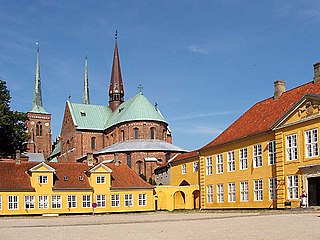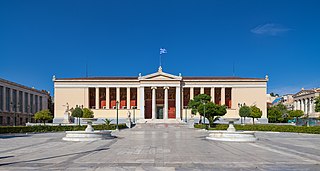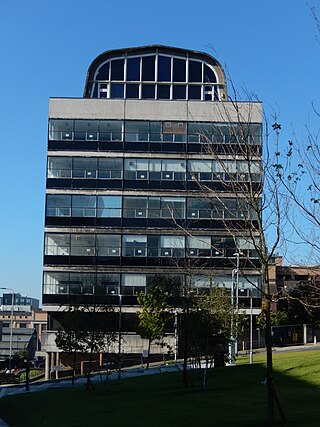Related Research Articles

The Namibian Defence Force (NDF) comprises the national military forces of Namibia. It was created when the country, then known as South West Africa, gained independence from apartheid South Africa in 1990. Chapter 15 of the Constitution of Namibia establishes the NDF and defines its role and purpose as, " ... to defend the territory and national interests of Namibia".

Vocational education is education that prepares people for a skilled craft as an artisan, trade as a tradesperson, or work as a technician. Vocational education can also be seen as that type of education given to an individual to prepare that individual to be gainfully employed or self employed with requisite skill. Vocational education is known by a variety of names, depending on the country concerned, including career and technical education, or acronyms such as TVET and TAFE.

Roskilde is a city 30 km (19 mi) west of Copenhagen on the Danish island of Zealand. With a population of 52,580, the city is a business and educational centre for the region and the 10th largest city in Denmark. It is governed by the administrative council of Roskilde Municipality.

The Roskilde Festival is a Danish music festival held annually south of Roskilde. It is one of the largest music festivals in Europe and the largest in the Nordic countries. It was created in 1971 by two high school students and a promoter. In 1972, the festival was taken over by the Roskilde Foundation, which has since run the festival as a non-profit organization for development and support of music, culture and humanism. In 2014, the Roskilde Foundation provided festival participants with the opportunity to nominate and vote upon which organizations should receive funds raised by the festival.

Education in Greece is centralized and governed by the Ministry of Education and Religious Affairs at all grade levels in elementary and middle school. The Ministry exercises control over public schools, formulates and implements legislation, administers the budget, coordinates national level university entrance examinations, sets up the national curriculum, appoints public school teaching staff, and coordinates other services.

RMIT University, officially the Royal Melbourne Institute of Technology, is a public research university in Melbourne, Australia.

Central Queensland University is an Australian public university based in central Queensland. CQUniversity is the only Australian university with a campus presence in every mainland state. Its main campus is at Norman Gardens in Rockhampton, however, it also has campuses in Adelaide (Wayville), Brisbane, Bundaberg (Branyan), Cairns, Emerald, Gladstone, Mackay, Melbourne, Noosa, Perth, Rockhampton City, Sydney and Townsville. CQUniversity also partners with university centres in several regional areas across Australia.

The educational system in Hungary is predominantly public, run by the Ministry of Human Resources. Preschool kindergarten education is compulsory and provided for all children between three and six years old, after which school attendance is also compulsory until age of sixteen. Primary education usually lasts for eight years. Secondary education includes three traditional types of schools focused on different academic levels: the Gymnasium enrols the most gifted children and prepares students for university studies; the secondary vocational schools for intermediate students lasts four years and the technical school prepares pupils for vocational education and the world of work. The system is partly flexible and bridges exist, graduates from a vocational school can achieve a two years program to have access to vocational higher education for instance. The Trends in International Mathematics and Science Study (TIMSS) rated 13–14-year-old pupils in Hungary among the best in the world for maths and science.
TAFE NSW is an Australian vocational education and training provider. Annually, the network trains over 500,000 students in campus, workplace, online, or distance education methods of education. It was established as an independent statutory body under the TAFE Commission Act 1990. The Minister for Regional Development, Skills and Small Business is responsible for TAFE NSW.
The Western Australian Certificate of Education (WACE) is the credential awarded to students who have completed senior secondary education in the state of Western Australia. It is the Western Australian graduation certificate of the Australian Senior Secondary Certificate of Education. Students are required to meet various breadth and depth requirements, achievement standards and literacy and numeracy standards across their final years of schooling. As of the 2020 WACE, there are 106 courses available for students to study. Many WACE students are awarded an Australian Tertiary Admission Rank (ATAR), summarising their results across all areas of study into one ranking for the purposes of university admission. Students may choose from ATAR courses, which count directly towards their ATAR, Vocational Education and Training courses, which are more practical courses and can lead to further vocational opportunities, and, from 2021, General courses, which provide pathways to university, employment, or further vocational education and training. From 2010, the WACE replaced the Tertiary Entrance Exam (TEE), as the standard academic examination for school leavers in Western Australia.

Pathlight School is a special school for high-functioning children with autism in Singapore. Founded in 2004, it is run by the non-profit Autism Resource Centre and comprises one half of the national educational provision for autistic children. The school coaches students in social and life skills, teaches them mainstream curriculum subjects and prepares them for employment in an autism friendly environment. With more than 1000 pupils enrolled, the school has been noted for its achievements in special education in Singapore.
Melbourne Polytechnic, formerly NMIT, is an institute of higher education and vocational education (TAFE) located in Melbourne, Australia that has been operating since around 1910.

Education in Sri Lanka has a long history that dates back two millennia. While the Constitution of Sri Lanka does not provide free education as a fundamental right, the constitution mentions that 'the complete eradication of illiteracy and the assurance to all persons of the right to universal and equal access to education at all levels" in its section on directive principles of state policy at (27. Sri Lanka's population had an adult literacy rate of 96.3% in 2015, which is above average by world and regional standards. Computer literacy in 2017 28.3% and phone users in 2017 105%, website users 32% in 2017. Education plays a major part in the life and culture of the country, which dates back to 543 BC. Sri Lanka's modern educational system modeled after Christian missionary system was brought about by its integration into the British Empire in the 19th century. Education currently falls under the control of both the Central Government and the Provincial Councils, with some responsibilities lying with the Central Government and the Provincial Council having autonomy for others. Education institutions with a tradition dating back to 5 BC are largely ignored by the state.

Himmelev is a largely residential area in the municipality of Roskilde in Denmark and is contiguous with Roskilde. The population in the parish is around 14,000 (2022). It is on the eastern shore of the southernmost part of Roskilde Fjord. It contains primarily subdivisions with single family homes, but one of the three high schools in Roskilde, Himmelev Gymnasium, is also located the town. The Norwegian owned liver paté factory Stryhn's is located in the northwestern part of Himmelev, close to Roskilde Fjord. Veddelev lies slightly to the northwest on a peninsula extending into Roskilde fjord, leaving a narrow waterway of one kilometer extending to the southeast into a rectangular shaped area of the fjord of around 8 sq mi, which contains Roskilde harbor to the south. Further north lies Risø on another peninsula in the fjord.

Central College, formerly Central College of Commerce, was a college situated in the centre of Glasgow. It merged with Glasgow Metropolitan College and Glasgow College of Nautical Studies in 2010 to form City of Glasgow College. The college had links to universities such as Caledonian and Glasgow University and provided courses such as Business Studies, Information Technology and Health, Hair and Beauty, Legal Studies and accountancy.

Education in Western Australia consists of public and private schools in the state of Western Australia, including public and private universities and TAFE colleges. Public school education is supervised by the Department of Education, which forms part of the Government of Western Australia. The School Curriculum and Standards Authority is an independent statutory authority responsible for developing a curriculum and associated standards in all schools, and for ensuring standards of student achievement, and for the assessment and certification according to those standards.

Education in Somalia refers to the academic system within Somalia. The Ministry of Education is officially responsible for education in Somalia, with about 15% of the nation's budget allocated to scholastic instruction. The breakaway republic of Somaliland maintains its own advanced Ministry of Education.
VIA University College is a university college organisation in Central Denmark Region, Denmark, established in January 2008. It is present in the region with a total of eight campuses.
Georgia Piedmont Technical College (GPTC) is a public community college based in Clarkston, Georgia. It is part of the Technical College System of Georgia (TCSG) and provides education for a three-county service area, mostly in the metro Atlanta area. The school's service area includes Dekalb, Rockdale, and Newton counties. GPTC is accredited by the Commission on Colleges of the Southern Association of Colleges and Schools (SACS) to award associate degrees, diplomas, and technical certificates of credit. Many of the school's individual technical programs are also accredited by their respective accreditation organizations. The College also offers free Adult Education courses for GED and HiSet test preparation and English as Second Language programming. Its Economic Development and Continuing Education division provides customized business and industry training to strengthen the workforce pipeline in Metro Atlanta.
Zealand Academy of Technologies and Business or Zealand is a school of higher education established in 2008 due to a merger of nine Danish Colleges, most dating back more than 100 years. It is regularly ranked within the top 4 business academies in Denmark and is currently ranked first in the Køge Municipality. Zealand operates five campuses in Region Zealand to the west and south of Copenhagen, Denmark. The campuses, with a total of some 3,200 students, are located in Næstved, Roskilde, Køge, Slagelse and Nykøbing Falster. The school is an independent self-owning institution subordinated to the Ministry of Science, Innovation and Higher Education. Degree programs offered are mainly applied degrees, especially in technology, IT, and business. The academy grants undergraduate and academic degrees but not master's or doctoral degrees. In addition to full-time studies, the academy offers supplemental education, part-time programs at bachelor's level, and short-term courses for people who need to strengthen their qualifications.
References
- 1 2 "Vocational Training of the Food and Service Industry". Slagteriskolen. Archived from the original on 7 January 2015. Retrieved 7 January 2015.
- ↑ "Slagteriskolen". Den Store Danske (in Danish). Retrieved 7 January 2015.
- ↑ "Frit udsyn til faglig stolthedn" (in Danish). byggeplads.dk. Retrieved 10 January 2015.

